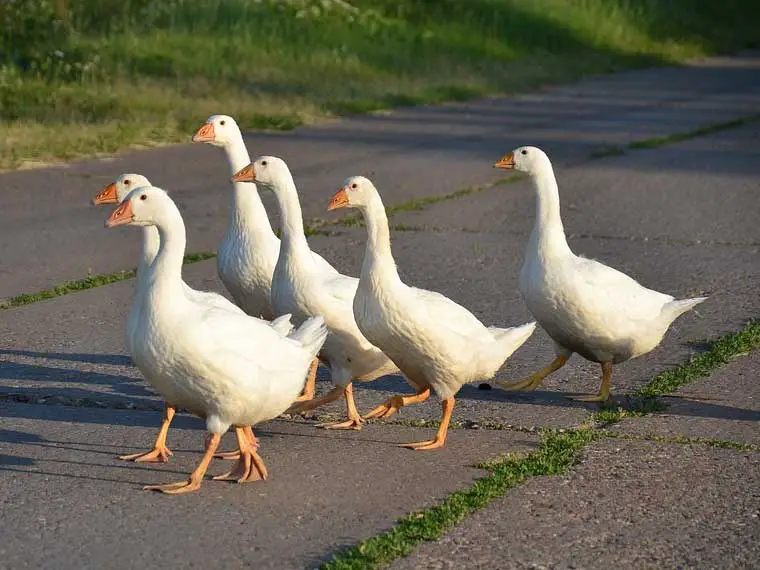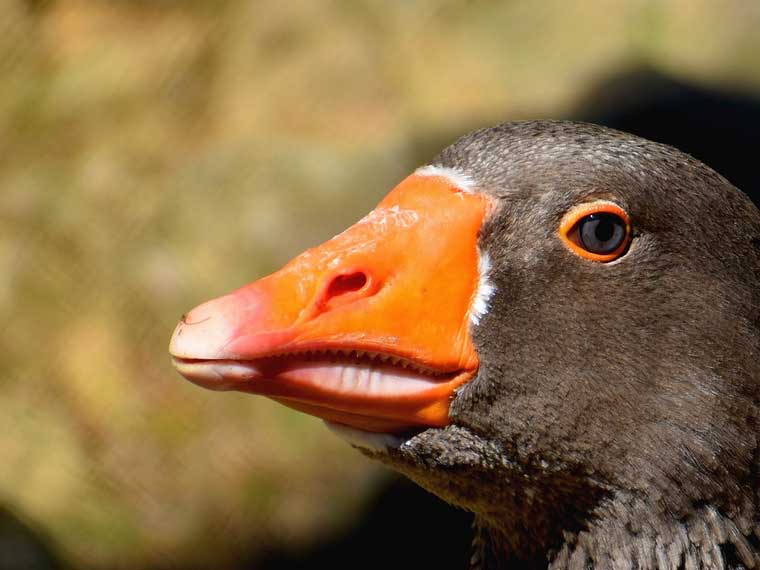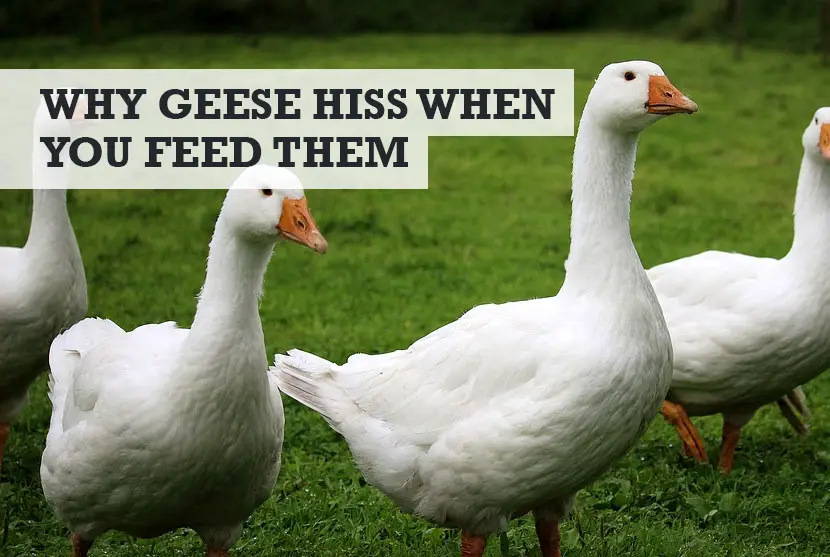When you see animals in the wild, you will often have the instinct to feed them. What decent person wouldn’t want to feed seemingly hungry birds, for example those geese at the local lake? However, if you’ve ever fed a goose and been hissed at, you might wonder why you even bothered in the first place.
Why do geese hiss when I feed them? Geese will hiss at you when you feed them as they are extremely territorial birds. They are protective of their young, aggressive by nature, and will see you as a threat. It’s not a good idea to approach and feed geese, you could even be attacked.
This might sound a somewhat drastic response but believe me, I’ve seen this happen before. Below I will explain why geese can attack you when you feed them and how you can prevent any issues.
Will geese attack you if you feed them?
Do you own a farm and have been looking at adding a goose or two into the mix? Or do you frequently come across these hungry-looking waterfowls on your strolls through the park?

Either way, it’s important to know why geese hiss and even possibly attack when you feed them – and what to do when this happens.
As I’ve established, a goose is the perfect example of an animal that is not going to offer you a good reception when you try to feed it. But why do they exhibit this behavior?
Why do geese hiss?
Different animals show their thanks for food in different ways. A dog is likely to wag its tail excitedly, a cat may bump its head against your hand, and a pig may show its gratitude by being snuggly and affectionate.
But a goose? A goose will likely hiss at you.
It’s quite surprising when geese hiss at you for simply trying to provide them with food. What kind of thanks is that?
As it turns out, it’s not much of a thanks at all. Geese, even the super hungry ones, prefer being left alone and are generally very aggressive towards humans regardless of how full or empty their tummies are.
In terms of the actual reason why geese hiss when you feed them, there are many possibilities. Some of the most common reasons why geese hiss include:
- They’re protective of their young: Geese, especially male geese (ganders), are extremely protective of their young (goslings). If you try to feed a goose while its egg, laying mate, or gosling is nearby it is going to hiss at you.
- They’re not scared of humans: Because geese are primarily found on domestic farms, residential or urban common grounds, they’re very used to humans. This means that they’re not even a little bit scared of you or I, and they have no problem letting us know.
- They fear humans: Geese might hiss at you in parks due to confusion over why a human is trying to be kind to them. Unfortunately, they might have had some bad experiences with people in the past, so eye you with suspicion, even when you’re offering food.
- They’re very territorial: When it comes to their territory, geese are quick to protect it from whatever they perceive to be a threat. This is normally because they have females, eggs, goslings, or limited resources in their area.
- They’re hangry: You’ve likely heard of the term ‘hangry’ before, and this is something that a goose will feel very regularly – especially if you, or other humans, feed them. This is because the goose will begin to expect food from humans, and when it is not immediately presented to them, they can easily become aggressive.
I found an excellent synopsis of studies into the vocalisations of geese which sums up the hissing they do (and honks).
Goose vocalizations depend very heavily on the context in which they are made, such as location, posture, age of bird, season, and social context. The “honk” call of the Canada goose is used variously to ward off intruders, advertise territory boundaries, as a long-distance call, to answer a mate, as part of a greeting ceremony after being separated from a mate, and when in flight or about to take flight. The honk call is loud and resonant (Whitford, 1998). “Hisses” are used basically when threatened, directed at short-distance intruders, which might include other geese, ducks, or humans. (Whitford, 1998).
The Gall Lab, https://pages.vassar.edu/sensoryecology/canada-goose-vocalizations/
Will geese attack if you feed them?
Usually, a goose hissing at you is a warning and a telltale sign that they’re not happy with you trying to feed them. Even though the sound of a goose hissing is enough to give anyone a fright, it doesn’t necessarily mean that it’s preparing itself for an attack.
After hissing, the next step in a goose’s defensive strategy honking and head bobbing, followed by chasing. Only after trying to unsuccessfully chase, you away will a goose try to physically attack you.

So, if you persist in trying to feed the goose, even after the warnings signs and hissing, then yes there is a chance the goose will attack you.
Handy Hint: I’ve previously written at length about the potential for a goose attack after being asked whether geese can kill human beings.
What should I do if a goose hisses at me while feeding it?
If a goose hisses at you while you’re feeding it, it’s essentially letting you know that it doesn’t like you, like what you’re attempting to do, or like the fact that you’re in its space. When you’re on the receiving end of a goose hiss, you should do the following:
- Immediately stop throwing food at, or near them.
- Begin backing away slowly and quietly, walking backwards, and maintaining eye contact with the goose.
- Try to be as calm, gentle, and quiet as possible to avoid making the goose think you’re acting in an aggressive manner.
- Do not run, shout, or attempt to kick your legs or swing your arms at the goose to scare it off – geese are far from easily frightened and this will merely annoy them even more!
How to feed geese safely
As I mentioned earlier, it is best to avoid feeding geese altogether unless you need to. You might own a property with geese on it, where you will need to feed them. If this is the case, here’s how you feed a goose safely, without any hissing (I hope).
First things first, you need to know what you should and should not be feeding geese. After that, I’ll talk you through how to go about feeding geese safely.
Should you feed geese just anything?
No, like all animals, geese have specific dietary requirements to keep them strong, healthy, happy, and adequately nourished. While geese are able to source most of what they need themselves, such as insects and aquatic plants, if you’re caring for them, you’ll need to handle the rest.
You should ensure that you’re feeding geese a diet that’s full of:
- Grains
- Proteins
- Fresh greens
- Insoluble grit
- Niacin
- Calcium
- Vitamins A and D
- Fresh drinking water
- Safe snacks like unsalted popcorn
Handy Hint: Have you ever worried about a goose pooping on your head when they are flying up high. Here’s all you need to know about geese pooping in-flight.
Should you feed geese bread?
Contrary to popular belief, and even though many goose-owners and park-goers continue to do so, geese should never be fed bread, chips, or crackers. These foods are truly terrible for geese and can cause tremendous digestive issues.
Make sure you’re also not feeding geese:
- Avocados
- Spinach
- Green tomatoes
- Citrus fruits
- Chocolate
- Onions
- Potatoes
- Unshelled nuts
- Raw nuts
- Rhubarb leaves
- Any food that is rotten or moldy
Avoid handfeeding at all costs
I know, I know, the idea of handfeeding a goose or two is hard to wipe from your mind. But wipe you must. Handfeeding geese is not recommended at all as it is detrimental to their health and wellbeing.
Some of the negative impacts that handfeeding has on geese includes dependency issues, malnutrition, overcrowding, and even delayed migration.
Instead, you should feed geese from a distance by throwing bite-sized food in their general direction – about a meter in front of them.
You can either feed geese on land or while they’re in the water, but the latter is preferred as it ensures the geese is swallowing water along with their food which helps their digestive system out a ton.
If you’re feeding a flock, it’s a good idea to throw decent piles of food in different directions to ensure each goose gets their fair share. This will also avoid you, good intentions, and all, causing what’s known as a feeding frenzy.
Of course, if the geese you’re feeding are on your property it’s a good idea to feed them in the same general area at every feed. Some backyard geese even eat their food directly from bowls. How wild (or not) is that?
Conclusion
When the hungry animal you’re feeding is friendly, fluffy, and adorable, feeding them can feel like your good deed for the day. But when the hungry animal you’re trying to feed makes you momentarily fear for your life? Then it feels less like a good deed and more like a death wish.
Geese can be like this.
You might get hissed at when feeding a goose. They could see you as a threat, perhaps have been hurt by humans before, and could be confused by the food as used to be threatened by people.
So, just avoid feeding geese and you won’t get hissed at.
You might also like…
- Why geese stand on just one leg
- How long you can expect a domestic goose to live
- Where do geese sleep during the night
Image in header via https://pixabay.com/photos/geese-white-poultry-birds-farm-2655516/


